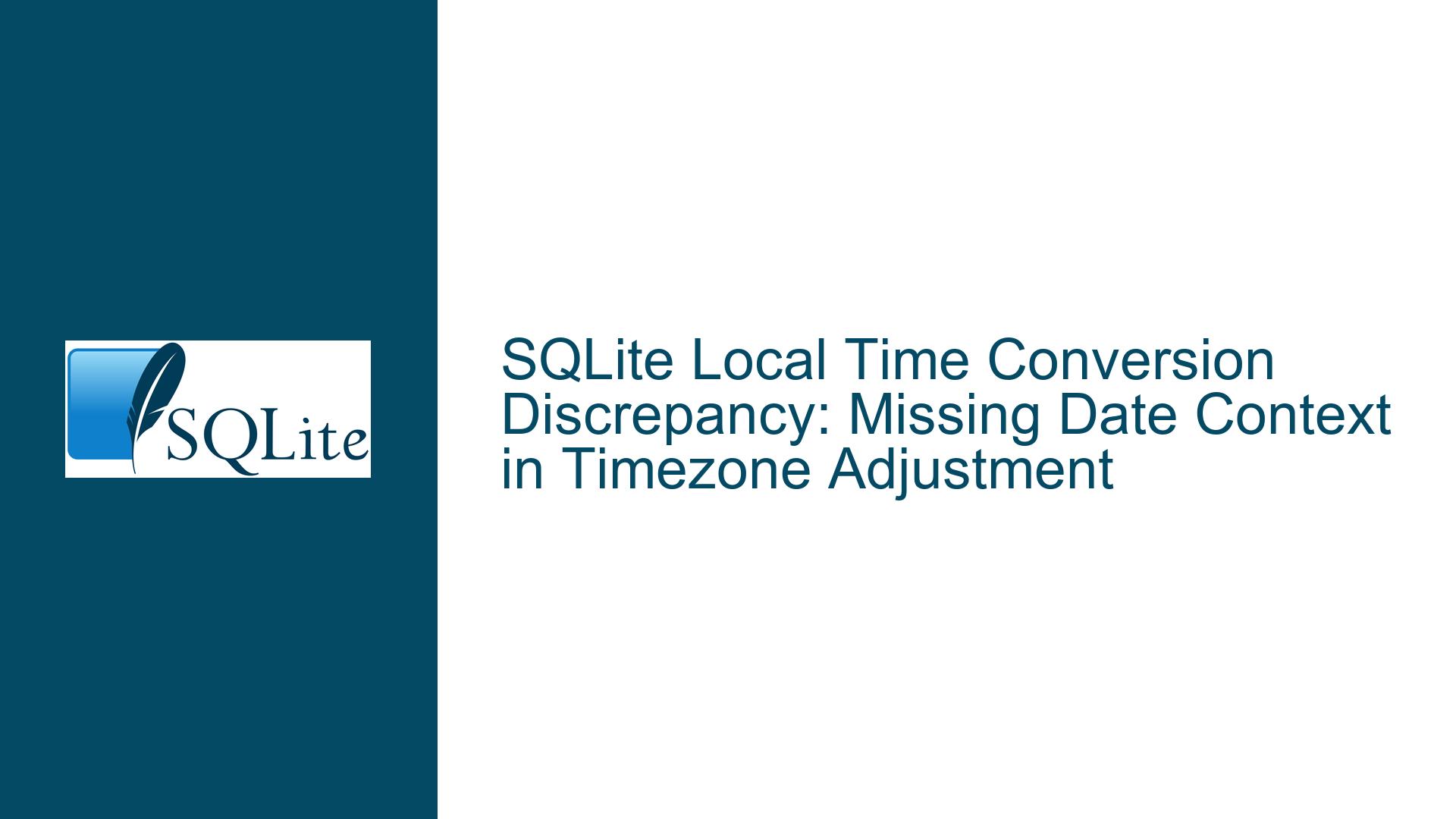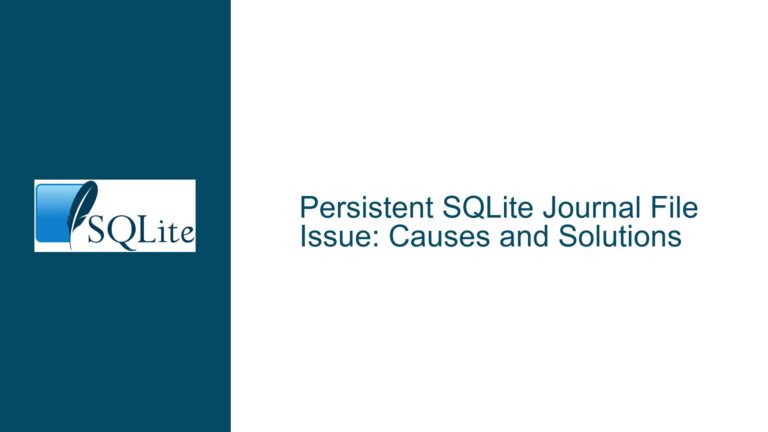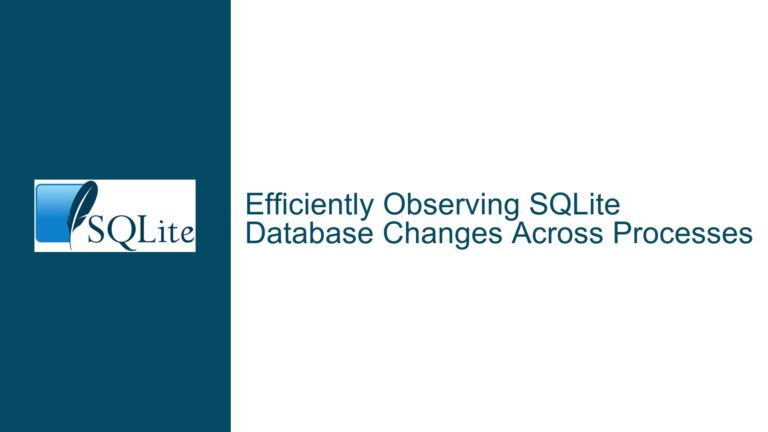SQLite Local Time Conversion Discrepancy: Missing Date Context in Timezone Adjustment
Issue Overview: Mismatched Local Time Results Due to Implicit Date Assumptions
When converting UTC timestamps to local time in SQLite, users may encounter unexpected discrepancies when applying the 'localtime' modifier. A common scenario involves using the current_time function (which returns only the time component in UTC) versus datetime('now') (which returns a full date-time string in UTC). When these values are adjusted with 'localtime', the results differ because SQLite implicitly assigns a default date to incomplete time values.
For example, consider a user in Brussels (UTC+1 with Daylight Saving Time (DST) active in summer):
-- At 2024-08-24 14:14:00 UTC (DST active in Brussels):
SELECT
time(current_time, 'localtime') AS t1, -- Returns 15:14:32 (UTC+1, no DST)
time('now', 'localtime') AS t2; -- Returns 16:14:32 (UTC+2, DST)
Here, current_time lacks a date component. SQLite defaults to 2000-01-01, a date outside DST for Brussels. The 'localtime' modifier applies the standard UTC+1 offset. Conversely, datetime('now') includes the current date (2024-08-24), so 'localtime' applies the DST UTC+2 offset.
This discrepancy arises from SQLite’s handling of incomplete temporal values and its reliance on the date component to determine timezone offsets (including DST transitions). Without an explicit date, SQLite cannot infer the correct historical or seasonal offset, leading to inconsistent conversions.
Possible Causes: Date Context Dependency in Timezone Calculations
1. Implicit Date Assignment for Time-Only Values
SQLite’s date/time functions operate under strict rules when parsing inputs:
- Complete date-time strings (e.g.,
'2024-08-24 14:14:00') are parsed as-is. - Time-only strings (e.g.,
'14:14:00') or results fromcurrent_timeare assigned a default date of 2000-01-01.
This behavior is documented but often overlooked. The choice of 2000-01-01 as the default date is arbitrary but consistent across SQLite versions. For timezone conversions, the date is critical because:
- Daylight Saving Time (DST) rules are date-dependent.
- Historical timezone offset changes (e.g., a country altering its UTC offset) require accurate dates.
2. Ambiguity in current_time vs. current_timestamp
The current_time function returns only the time component (HH:MM:SS) in UTC, discarding the date. In contrast, current_timestamp returns a full date-time string (e.g., '2024-08-24 14:14:00'). When localized, these functions behave differently:
SELECT
time(current_time, 'localtime') AS t1, -- Uses 2000-01-01 (no DST)
time(current_timestamp, 'localtime') AS t2; -- Uses current date (DST-aware)
This distinction is subtle but critical: current_time discards date context, forcing SQLite to rely on the default date.
3. Timezone Offset Calculation Without Date Context
SQLite’s 'localtime' modifier relies on the operating system’s timezone database, which requires a date and time to compute offsets accurately. When only a time is provided, SQLite cannot determine whether DST was active on the implicit date (2000-01-01). For Brussels:
- 2000-01-01: Standard time (UTC+1).
- 2024-08-24: DST (UTC+2).
Thus, converting a time-only value with 'localtime' will always use the standard offset for the default date, ignoring current DST rules.
Troubleshooting Steps, Solutions & Fixes: Ensuring Date Context in Timezone Conversions
Step 1: Use Full Date-Time Sources for Localization
Avoid current_time for timezone conversions. Instead, use functions that include the date:
-- Problematic:
SELECT time(current_time, 'localtime');
-- Correct:
SELECT time('now', 'localtime');
SELECT datetime(current_timestamp, 'localtime');
The 'now' argument and current_timestamp include the current date, enabling accurate DST calculations.
Step 2: Explicitly Manage Date Context for Historical or Custom Dates
When working with time-only data (e.g., stored times without dates), explicitly assign a date before conversion:
-- Example: Convert time '14:14:00' to Brussels local time on 2024-08-24
SELECT time('2024-08-24 ' || time_column, 'localtime') FROM table;
By concatenating the date, you ensure the correct DST rules apply.
Step 3: Validate Timezone Behavior with Explicit Dates
Test SQLite’s localization behavior using known dates to confirm DST handling:
-- Brussels in January (no DST):
SELECT datetime('2000-01-01 12:00:00', 'localtime'); -- Returns 13:00:00 (UTC+1)
-- Brussels in August (DST):
SELECT datetime('2024-08-01 12:00:00', 'localtime'); -- Returns 14:00:00 (UTC+2)
This confirms that the same UTC time localizes differently depending on the date.
Step 4: Handle Edge Cases with Custom Calendar Tables
For applications requiring precise historical timezone offsets, maintain a timezone rule table:
CREATE TABLE tz_rules (
region TEXT,
start_date TEXT, -- When the rule becomes active
offset TEXT -- UTC offset (e.g., '+01:00', '+02:00')
);
-- Example entry for Brussels DST:
INSERT INTO tz_rules VALUES
('Europe/Brussels', '2024-03-31', '+02:00'),
('Europe/Brussels', '2024-10-27', '+01:00');
Join this table with your data to apply offsets manually:
SELECT
datetime(utc_time, tz.offset) AS local_time
FROM
events
JOIN tz_rules tz ON events.date >= tz.start_date
WHERE
tz.region = 'Europe/Brussels'
ORDER BY
tz.start_date DESC
LIMIT 1;
Step 5: Understand SQLite’s Timezone Implementation Limits
SQLite delegates timezone conversions to the host operating system’s C library (e.g., localtime_r() on Unix). This means:
- Accuracy depends on the OS’s timezone database. Ensure the OS is updated, especially around DST transitions.
- Leap seconds are ignored. SQLite assumes every day has exactly 86,400 seconds.
For applications requiring leap-second accuracy, supplement SQLite with external libraries or services.
Final Solution: Always Pair Times with Explicit Dates
To prevent localization errors, never store or process times without dates in SQLite. Use TEXT or INTEGER (Unix epoch) types to preserve full date-time context:
-- Store as ISO 8601 strings:
CREATE TABLE events (
id INTEGER PRIMARY KEY,
event_time TEXT -- Format: 'YYYY-MM-DD HH:MM:SS'
);
-- Query with localization:
SELECT datetime(event_time, 'localtime') FROM events;
By adhering to these practices, you ensure that timezone conversions in SQLite account for DST and historical offset changes, eliminating discrepancies caused by implicit date assumptions.






